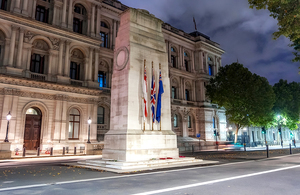Global Windows Donates To Bluebell Wood
Last May, Global Windows pledged to donate £5 to the Bluebell Wood Children’s Hospice for every window and door installation carried out,...
Read Full Article
The public have been asked not to gather at the Cenotaph due to coronavirus and to be careful to social distance at any other Remembrance Sunday ceremonies.
For the first time, the big service in London will be a closed, with the government providing advice to Local Authorities in England for events at community war memorials.
Culture Secretary Oliver Dowden has asked people to mark Sunday 8 November at home.
Around 10,000 people usually gather at the Cenotaph each year for the National Service of Remembrance and the two minute silence at 11:00am.
The service is expected to go ahead with representatives of the Royal Family, the government and the Armed Forces and a small representation from the Commonwealth, other countries and territories, all laying wreaths. The annual march past the Cenotaph will not take place, but some veterans will be invited to attend the service which will be made covid-secure by minimising attendance and ensuring strict social distancing measures are in place.
The public are urged to remember all those who paid the ultimate sacrifice by coming together for a national moment of silence at 11am as the service is broadcast nationwide on BBC One, Sky and ITV.
Local authorities and businesses
The government has also provided advice for councils in England on how to ensure that those hosting local Remembrance events can do so safely. Measures include reducing numbers, focusing attendance on those wishing to lay wreaths and observing social distancing at all times.
All gatherings involving more than 6 people will need to be organised by a business, a charitable, benevolent or philanthropic institution or a public body. Organisers will also be required to carry out a risk assessment to limit the risk of transmission of the virus.
“This Remembrance Sunday has a particular significance as it marks one hundred years since the Cenotaph was installed. Whilst we will mark this occasion properly, it is with a heavy heart that I must ask people not to attend the ceremony in order to keep veterans and the public safe.”
– Oliver Dowden
Culture Secretary, Government Minister
Advice
Communities Secretary Rt Hon Robert Jenrick MP said: "We will not let these difficult times stop us from properly commemorating the sacrifices of those who protected this country in our darkest hour and those who are serving in our Armed Forces today. That’s why we have published advice for councils, so that local Remembrance Day events can take place safely and communities are able to honour our brave service men and women. We are safer because of the sacrifices they have made and the battles they have fought."
Two minutes silence
Bob Gamble OBE, Assistant Director for Commemorative Events for The Royal British Legion said: "The decision not to proceed with the annual March Past the Cenotaph has been taken by the Government based on expert advice to protect the health and well-being of all those would have been travelling to and participating in the event. Whilst it is deeply disappointing that the march will not be taking place this year, we can all still play a part in ensuring we mark the occasion appropriately and pay tribute to the service and sacrifice of our Armed Forces on Remembrance Sunday. We are encouraging people across the country to participate in their own personal moment of Remembrance whether that be watching the Service on television or pausing for the Two Minute Silence."
The Cenotaph
Meaning ‘empty tomb’, the Cenotaph symbolises the unprecedented losses of the First World War and is dedicated to ‘The Glorious Dead’. The Cenotaph was designed by Edwin Lutyens and was initially erected as a temporary structure for Peace Day in July 1919. The structure was so popular a permanent version was commissioned. Since then, the Cenotaph has become the focal point of national commemoration.
Picture: The Cenotaph.
Article written by Cathryn Ellis
29th October 2020